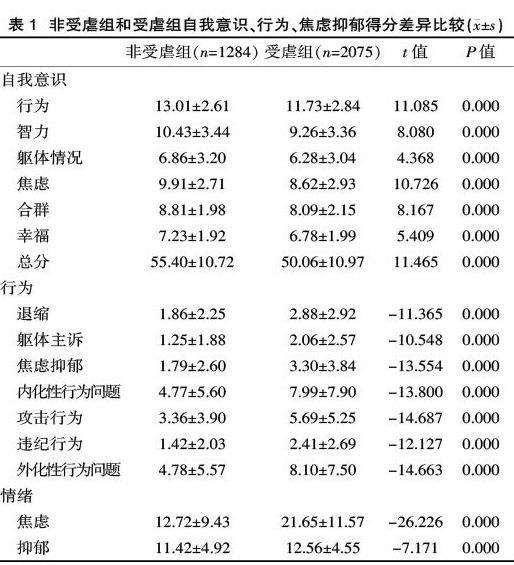心理虐待对儿童自我意识、行为和情绪的影响
2019-07-31潘辰管冰清罗学荣邓云龙
潘辰 管冰清 罗学荣 邓云龙


[摘要] 目的 探讨心理虐待对儿童自我意识、行为和情绪的影响。方法 采用儿童心理虐待量表、儿童自我意识量表、Achenbach儿童行为评定量表、儿童焦虑性情绪障碍筛查表、儿童抑郁障碍自评量表对湖南省7 644名3~9年级学生进行评估。结果 ①受虐儿童的自我意识得分低于非受虐儿童,受虐儿童的内化性行为问题、外化性行为问题、焦虑和抑郁得分高于非受虐儿童,两者差异有统计学意义(P<0.001);②心理虐待对自我意识有负性预测作用,心理虐待对内化性行为问题、外化性行为问题、焦虑和抑郁有正性预测作用。结论 心理虐待对儿童的自我意识、行为、情绪都有负性影响。
[关键词] 心理虐待;儿童;自我意识;行为;焦虑;抑郁
[Abstract] Objective To explore the effects of psychological abuse on children's self-awareness, behavior and emotions. Methods The children's psychological abuse scale, children's self-awareness scale, Achenbach child behavior rating scale, children's anxiety mood disorder screening table, and children's depression self-rating scale were used to evaluate 7644 students in grades 3-9 in Hunan Province. Results 1.The abused children's self-awareness score was lower than that of non-abuse children. The abused children's internalized sexual behavior problems, externalized sexual behavior problems, anxiety and depression scores were higher than non-abuse children, and the differences were statistically significant(P<0.001); 2.psychological abuse has a negative predictive effect on self-awareness, and psychological abuse has a positive predictive effect on internalized sexual behavior problems, externalized behavior problems, anxiety and depression. Conclusion Psychological abuse has a negative impact on children's self-awareness, behavior and mood.
[Key words] Psychological abuse; Children; Self-awareness; Behavior; Anxiety; Depression
心理虐待是兒童虐待的核心部分,对儿童心理造成的不良影响广泛而深远。既往研究发现,心理虐待无论是与其他虐待(如躯体虐待、性虐待)同时存在还是单独存在,都是对儿童心理问题最显著的预测因子。有心理虐待经历的儿童出现纪律问题、逃学、休学、离家出走、犯罪和饮酒行为、抑郁、焦虑、自伤和自杀行为的风险增加。国内外对儿童虐待的研究重点放在躯体虐待和性虐待,心理虐待的研究较少、且样本量普遍较小。该研究对中国某省小学/初中儿童心理虐待进行调查,旨在探讨心理虐待对儿童心理健康的影响。报道如下。
1 对象与方法
1.1 研究对象
该研究调查时间为2005年9—12月。对湖南省长沙、益阳、娄底、怀化、郴州、永州6个城市中小学生采用分层、随机、整群的抽样方法,共调查了3~9年级学生7 644人。最后获得有效问卷7 248份,有效回收率为94.8%。被试年龄7~17岁,平均年龄(11.64±2.344)岁;男性3 847人,女性3 401人;城市2 676人,农村4 572人;小学3 806人,初中3 442人。
1.2 工具
①儿童心理虐待量表 (Child Psychological Maltreatment Scale, CPM):包含23个条目、5个维度:恐吓、忽视、贬损、干涉、纵容。使用5级评分,评分越高代表遭受心理虐待越频繁。任何一个条目选择“4”为心理虐待阳性,所有条目选择 “0”或者“1”为心理虐待阴性。有良好的信度和效度(Cronbachs α=0.84,重测信度=0.863)[10];②儿童自我意识量表 (Childrens Self-concept Scale,CSCS):包含80个条目、6个分量表:行为、智力与在校情况、躯体外貌与属性、焦虑、合群、幸福与满足,有良好的信度和效度[11];③Achenbach儿童行为评定量表 (Child Behavior Checklist,CBCL):包含社会能力和行为问题两个部分。行为问题部分包含113个条目、两个维度:内化性行为问题和外化性行为问题。内化性行为问题包括退缩、躯体主诉、焦虑抑郁因子,外化性行为问题包括违纪行为、攻击性行为因子,有良好的信度和效度[11];④儿童焦虑性情绪障碍筛查表(The Screen for Child Anxiety Related Emotional Disorders,SCARED),SCARED包含41个条目,有良好的信度和效度;⑤儿童抑郁障碍自评量表 (Depression Self-rating Scale for Children,DSRSC):DSRSC包含18个条目,有良好的信度和效度。
1.3 统计方法
采用Visual Foxpro 9.0软件建立数据库,所有资料用SPSS l8.0统计学软件进行统计分析。计量资料(x±s)表示,组间比较采用t检验,多因素分析采用Logistic逐步回归分析,P<0.05为差异有统计学意义。
2 结果
2.1 非受虐组和受虐组在儿童自我意识、行为、情绪的得分比较
非受虐组和受虐组儿童在儿童自我意识、行为、焦虑抑郁得分比较见表1。受虐组的行为、智力、躯体情况、焦虑、合群、幸福分量表分及自我意识量表总分低于非受虐组,内化性行为问题(退缩、躯体主诉、焦虑抑郁)、外化性行为问题(攻击行为、违纪行为)、焦虑、抑郁得分高于非受虐组,两者差异有统计学意义(P<0.001)。
2.2 心理虐待对自我意识、行为和情绪影响的多元线性回归分析
将儿童自我意识、内化性行为问题、外化性行为问题、焦虑、抑郁分别作为因变量,心理虐待5个维度和儿童性别、年龄等一般资料共15个变量作为自变量进行多元线性回归分析,结果见表2。恐吓、忽视、贬损维度对自我意识有负性预测作用(F=49.238,P=0.000,方程解释度11.4%);恐吓、贬损、干涉、纵容维度对内化性行为问题和外化性行为问题有正性预测作用(内化性行为问题:F=52.191,P=0.000,方程解释度10.3%;外化性行为问题:F=53.000,P=0.000,方程解释度9.6%);恐吓、忽视、贬损、干涉、纵容维度对焦虑有正性预测作用(F=182.517,P=0.000,方程解释度24.5%);恐吓、忽视、贬损、纵容维度对抑郁有正性预测作用(F=48.221,P=0.000,方程解释度9.3%)。
3 讨论
自我意识对于心理健康的调节有重要意义,自我意识低的儿童可能存在情绪行为问题或社会适应不良[14]。研究发现,儿童越感受到父母的关怀和温暖,自我意识就愈高;而父母对儿童教育情绪化,则容易使其出现自我意识偏离[15]。本研究發现,儿童遭受恐吓、忽视、贬损越多,自我意识水平越低。原因可能是心理受虐儿童会将从虐待者那里收到的消极评价纳入自我概念,从而对自我意识和心理调适能力产生重大影响。
研究发现,很多行为问题都与儿童期心理虐待有关。Caspi A等发现,即使在考虑遗传因素的情况下,母亲对儿童的情感表达在其反社会行为的发展中也起着决定性作用,受到较多忽视的儿童会有更多的反社会行为问题[17]。该研究发现,儿童遭受恐吓、贬损、干涉、纵容越多,退缩行为、躯体主诉、违纪行为、攻击行为等行为问题越明显。原因可能是父母将负性生活事件引发的不良情绪通过转移等防御机制释放到儿童身上,使其在责骂、拒绝、忽视中体验挫折感与焦虑,那么儿童也可能会以攻击性行为来减轻心理不适感。
研究发现,儿童期心理虐待与成年后的抑郁焦虑之间有关。该研究发现,儿童遭受心理虐待越多,焦虑抑郁情绪就会越严重。原因可能是因为抑郁认知由施虐者直接传递给儿童,这种认知风格一旦形成,就会促使特定的抑郁易感性增加。
该研究表明,心理虐待对儿童的自我意识、行为、情绪都有负性影响,应该引起家庭和社会重视,大力开展儿童心理虐待预防和干预工作。
[参考文献]
[1] Lo CK,Ho FK,Chan KL,et al.Linking Healthcare and Social Service Databases to Study the Epidemiology of Child Maltreatment and Associated Health Problems: Hong Kong's Experience[J].The Journal of pediatrics,2018,202291-299.e1.
[2] Arslan G. Psychological maltreatment, coping strategies, and mental health problems: A brief and effective measure of psychological maltreatment in adolescents[J].Child Abuse & Neglect,2017,68:96-106.
[3] Hodgdon HB,Spinazzola J,Briggs EC, et al.Maltreatment type, exposure characteristics, and mental health outcomes among clinic referred trauma-exposed youth[J].Child Abuse & Neglect,2018, 82: 12-22.
[4] Gong J,Chan RCK. Early maladaptive schemas as mediators between childhood maltreatment and later psychological distress among Chinese college students[J].Psychiatry Research,2018,1(259):493-500.
[5] Ashy M,Yu B,Gutowski E.Childhood Maltreatment, Limbic Dysfunction, Resilience, and Psychiatric Symptoms[J].Journal of Interpersonal Violence,2017 (11):1-27.
[6] Wu Q,Chi P,Lin X,et al.Child maltreatment and adult depressive symptoms: Roles of self-compassion and gratitude[J]. Child Abuse & Neglect,2018,80:62-69.
[7] Thomassin K,Shaffer A,Madden A,et al.Specificity of childhood maltreatment and emotion deficit in nonsuicidal self-injury in an inpatient sample of youth[J].Psychiatry Research,2016,10(244):103-108.
[8] Falgares G,Marchetti D,Manna G,et al.Childhood Maltreatment,Pathological Personality Dimensions, and Suicide Risk in Young Adults[J].Frontiers in Psychology,2018,9:806.
[9] Esser MB,Rao GN,Gururaj G.Physical abuse,psychological abuse and neglect: Evidence of alcohol-related harm to children in five states of India[J].Drug and Alcohol Review,2016,35(5):530-538.
[10] 潘辰.兒童心理虐待量表修订及流行病学调查[D].长沙:中南大学,2010.
[11] 汪向东,王希林,马弘.心理卫生评定量表手册增订版[M]. 北京:中国心理卫生杂志社,1999:306-307.
[12] 王凯,苏林雁,朱焱,等.儿童焦虑性情绪障碍筛查表的中国城市常模[J].中国临床心理学杂志,2002,4(10):270-272.
[13] 苏林雁,王凯,朱焱,等.儿童抑郁障碍自评量表的中国城市常模[J].中国心理卫生杂志,2003,8(17):547-549.
[14] 官旭华,石淑华.儿童自我意识[J].国外医学社会医学册,2001,18(1):13-17.
[15] 向小平,张春林,邹泓.小学生自我概念的发展及其与人格的相关研究[J].中国临床心理学杂志,2006,14:194-296.
[16] Gibb BE,Chelminski I,Zimmerman M.Childhood emotional,physical, and sexual abuse, and diagnoses of depressive and anxiety disorders in adult psychiatric outpatients[J].Depression and Anxiety,2007,24:256-263.
[17] Dorota Iwaniec. The Emotionally Abused and Neglected Child: Identification, Assessment and Intervention. A Practice Handbook[M].2nd ed.John Wiley & Sons,2006.
(收稿日期:2019-01-21)
